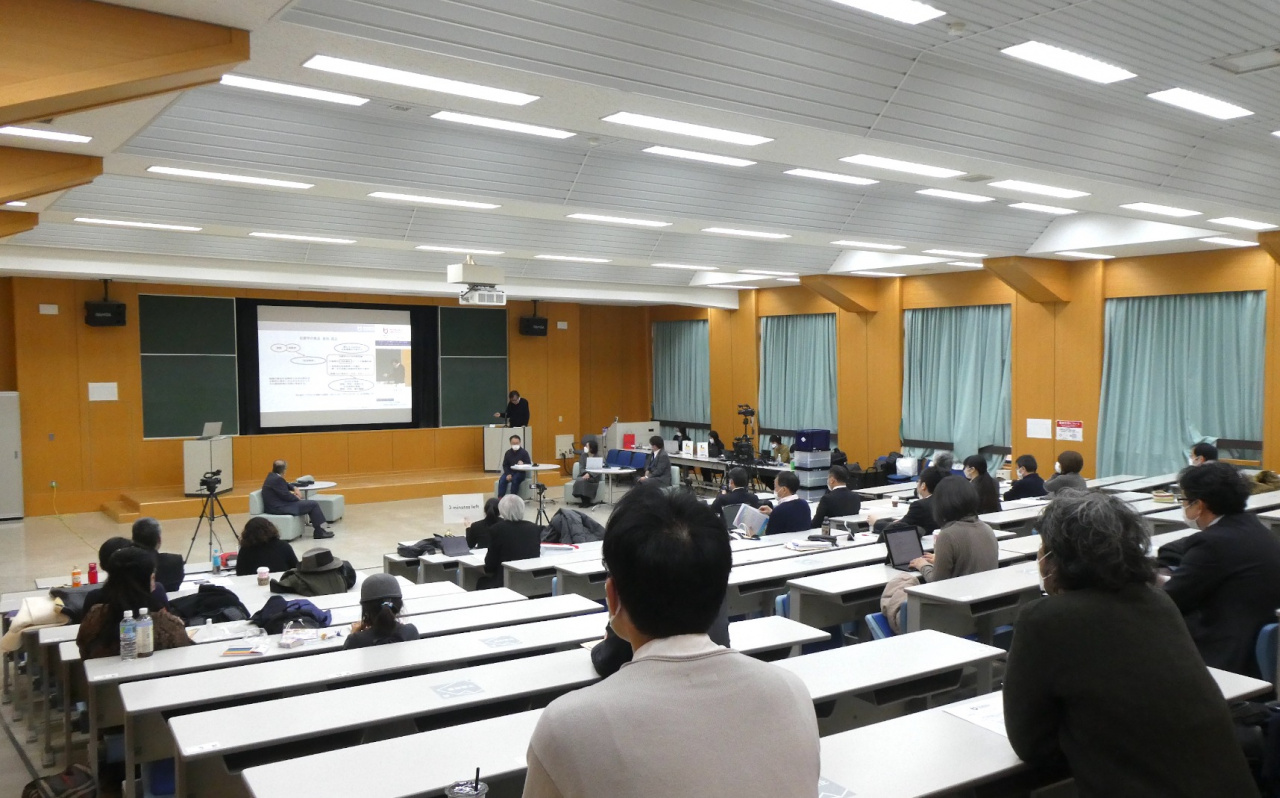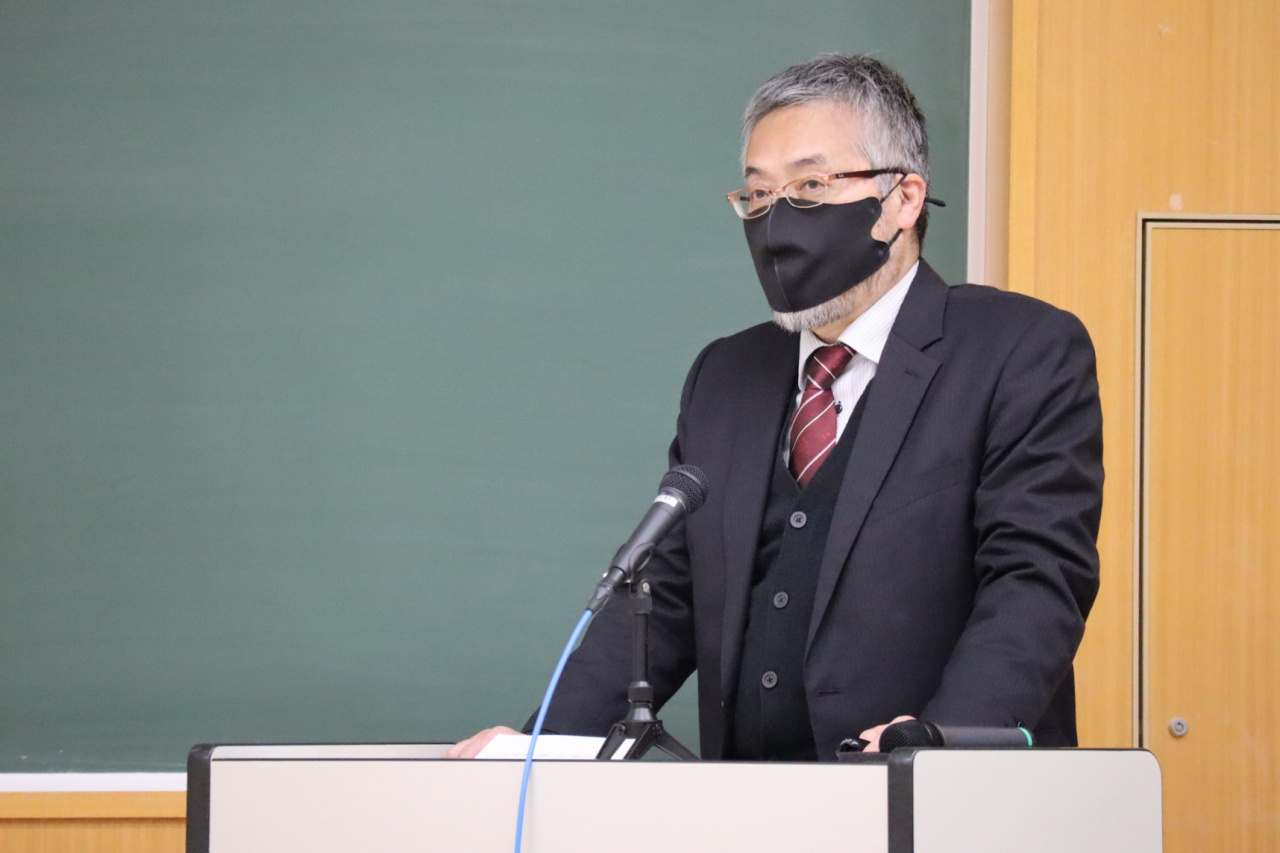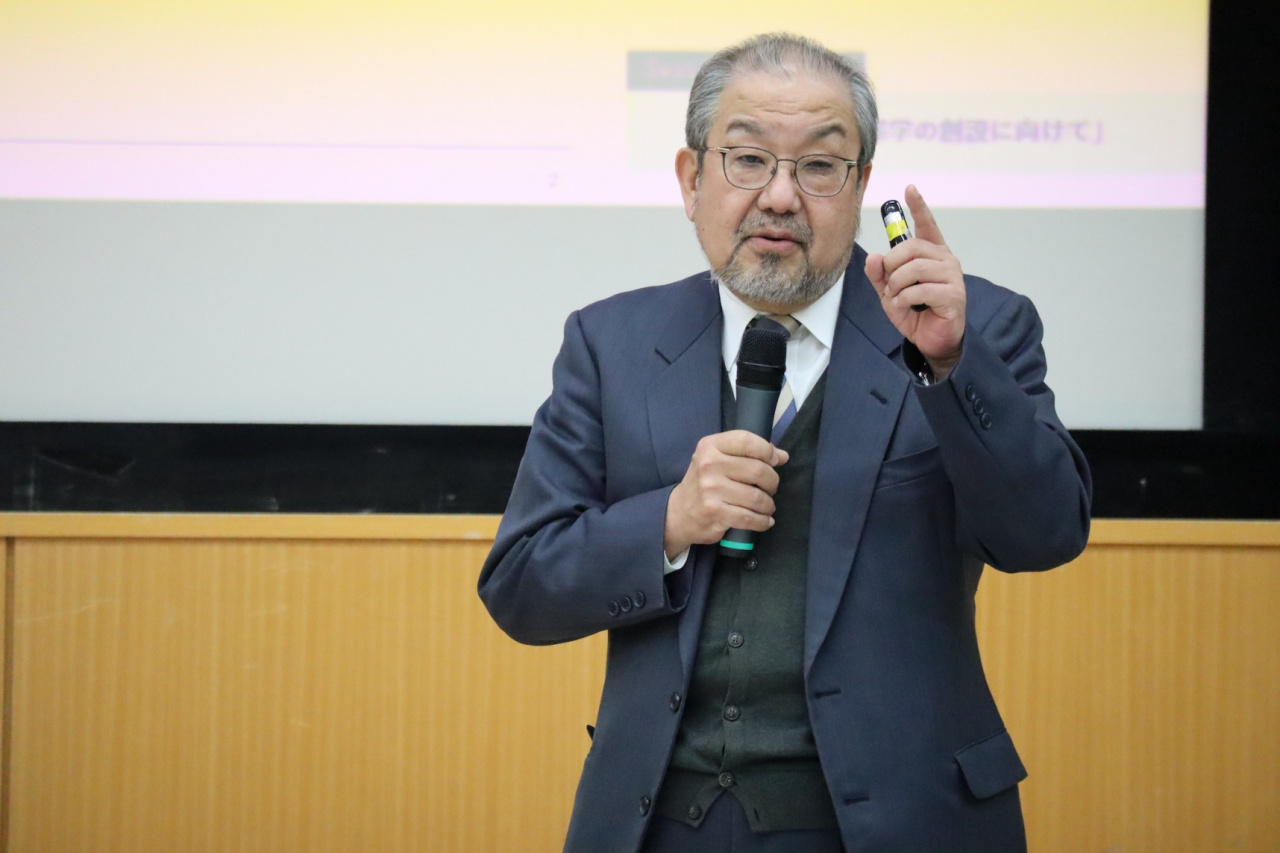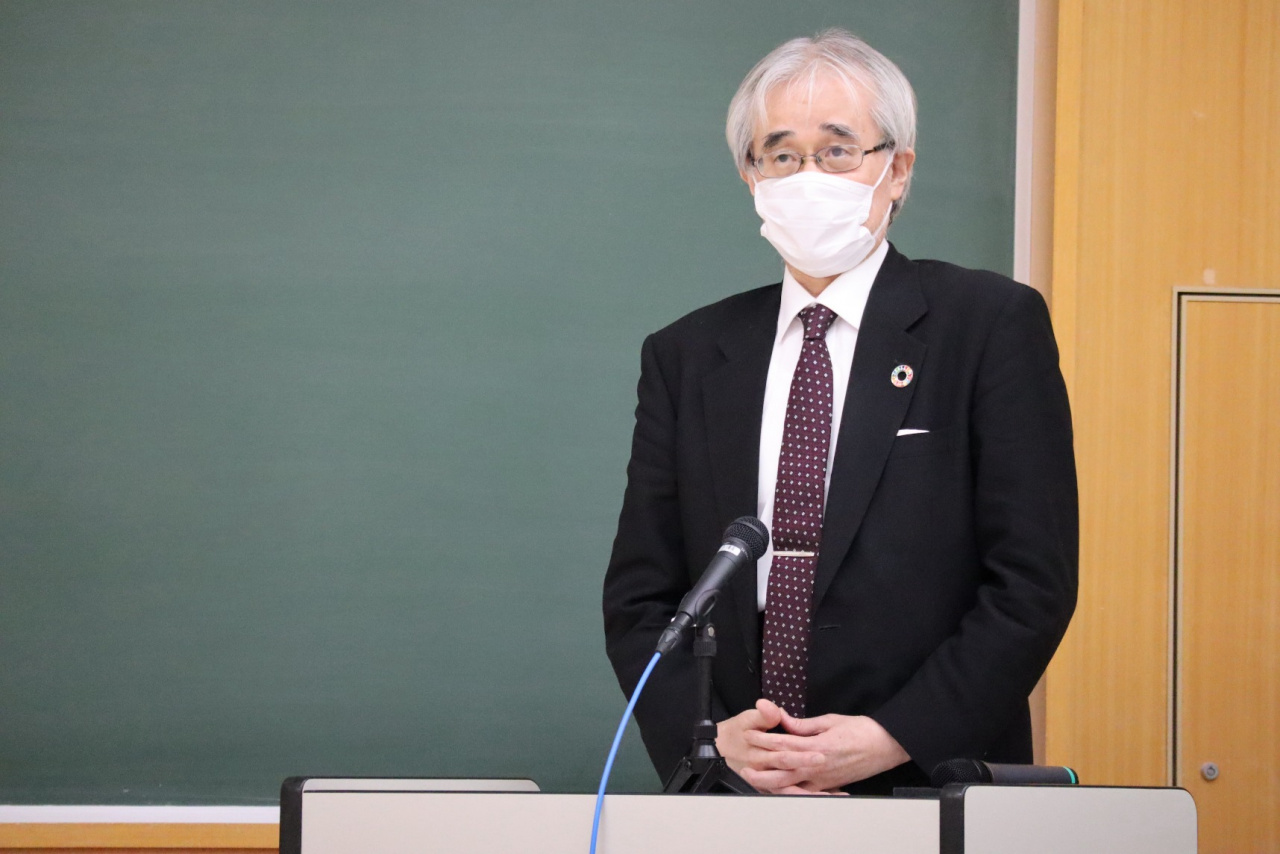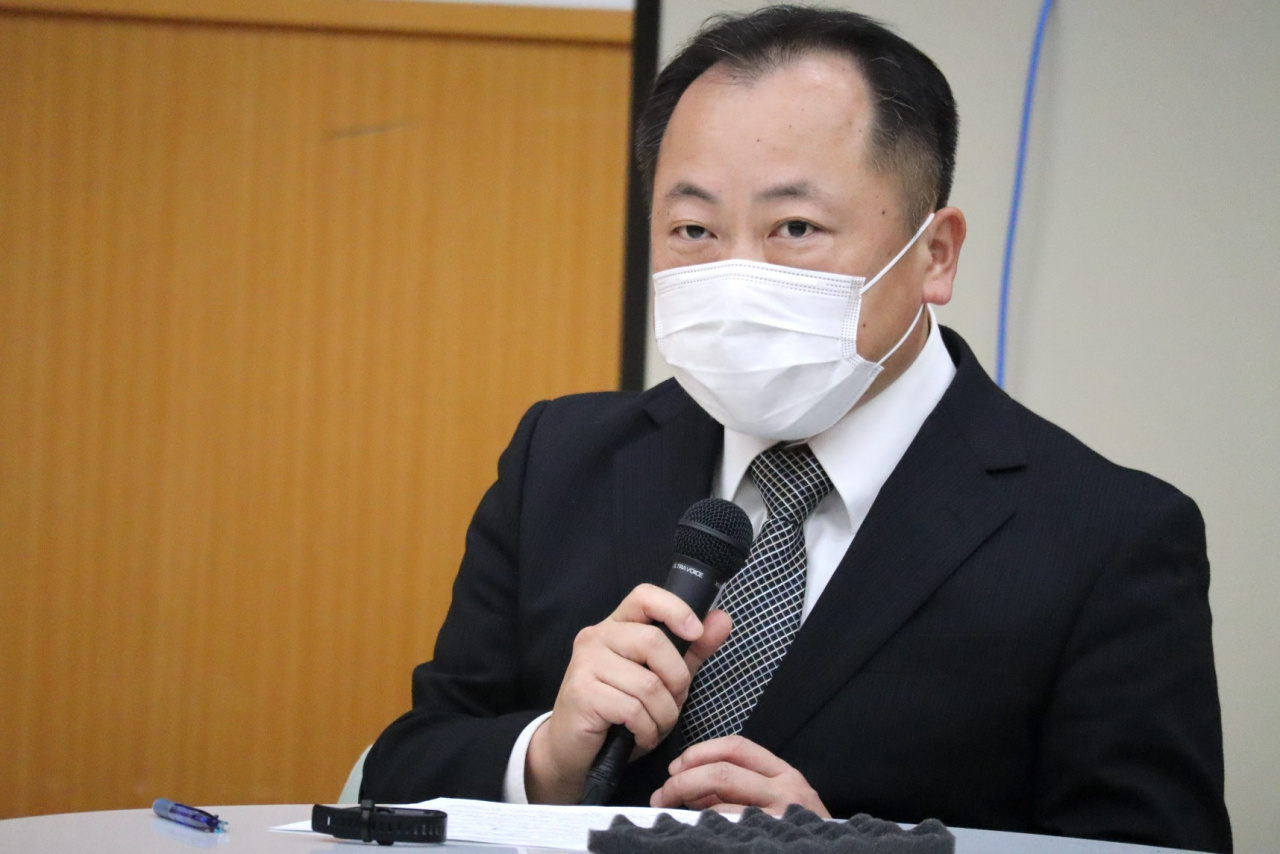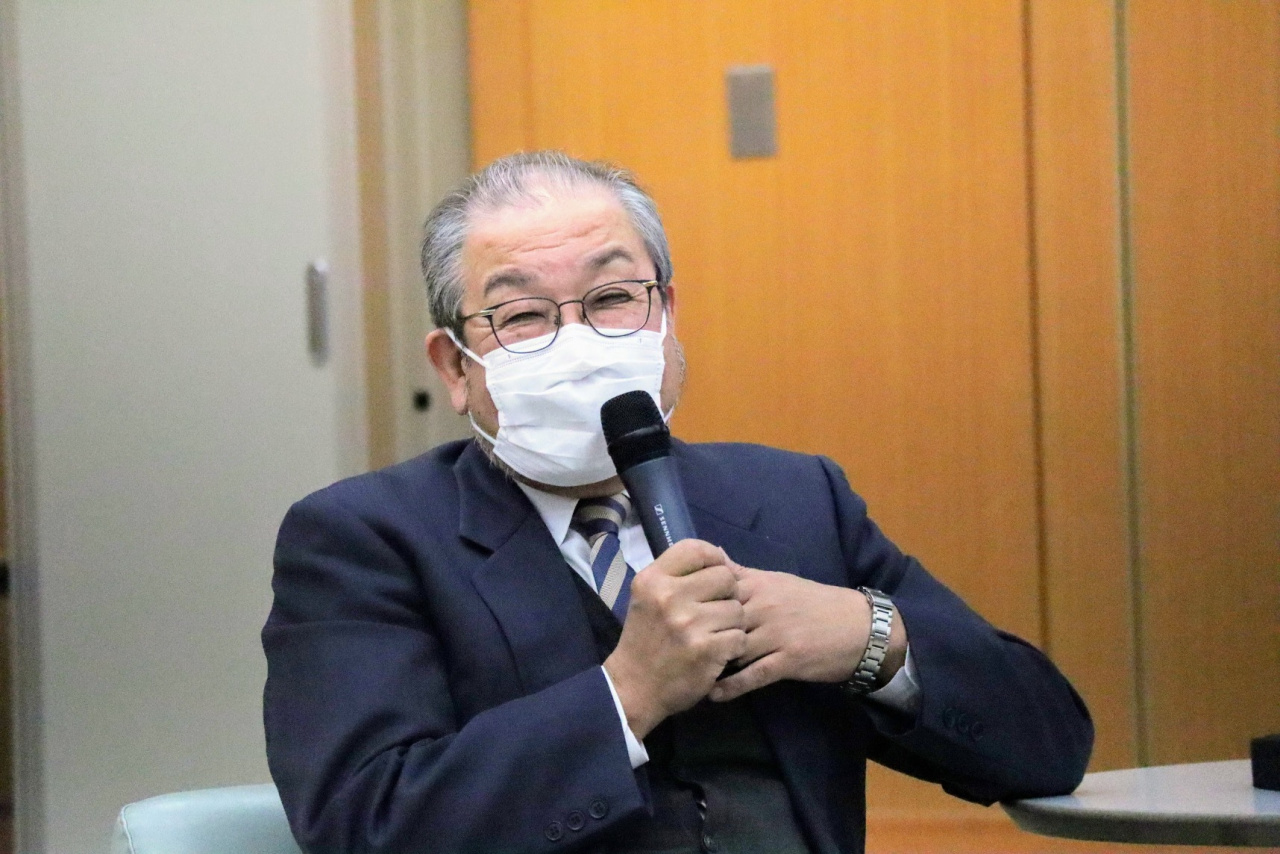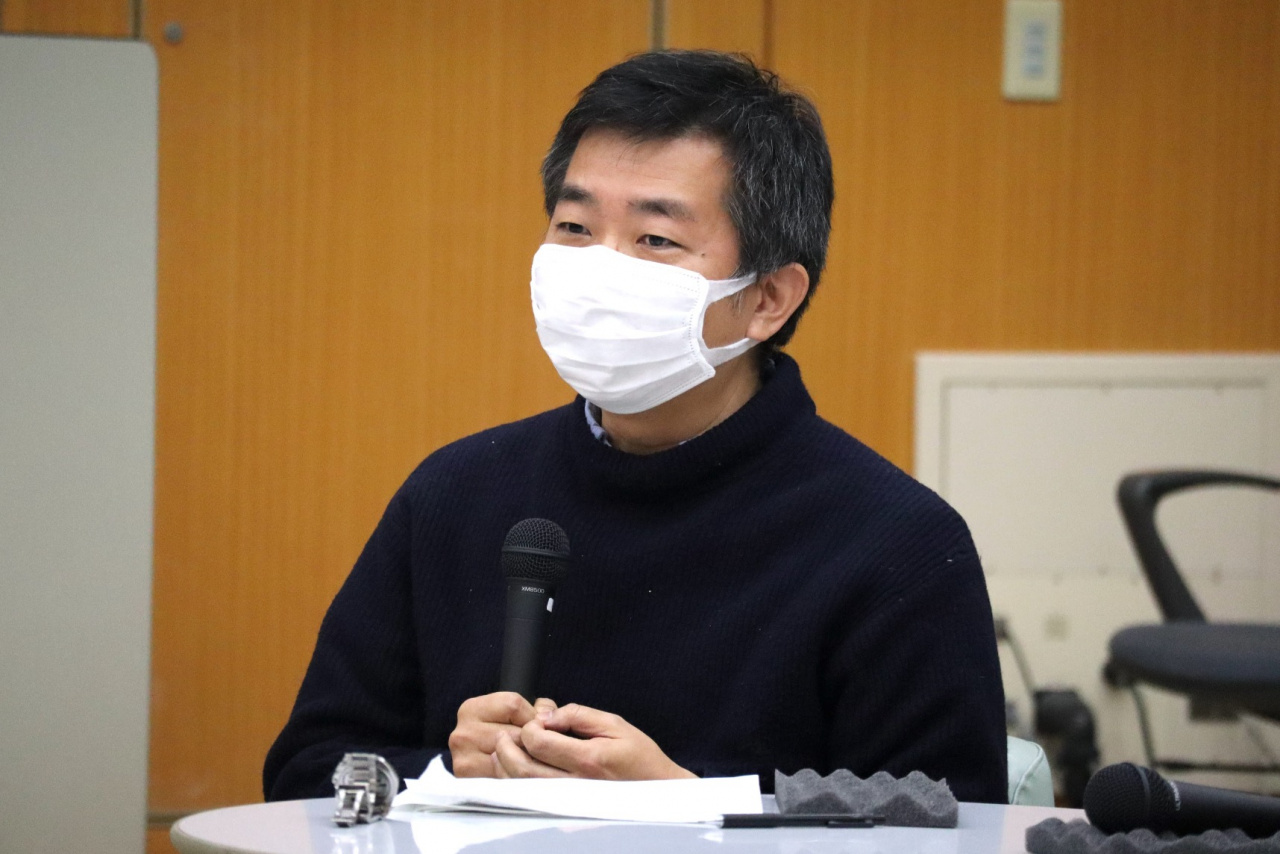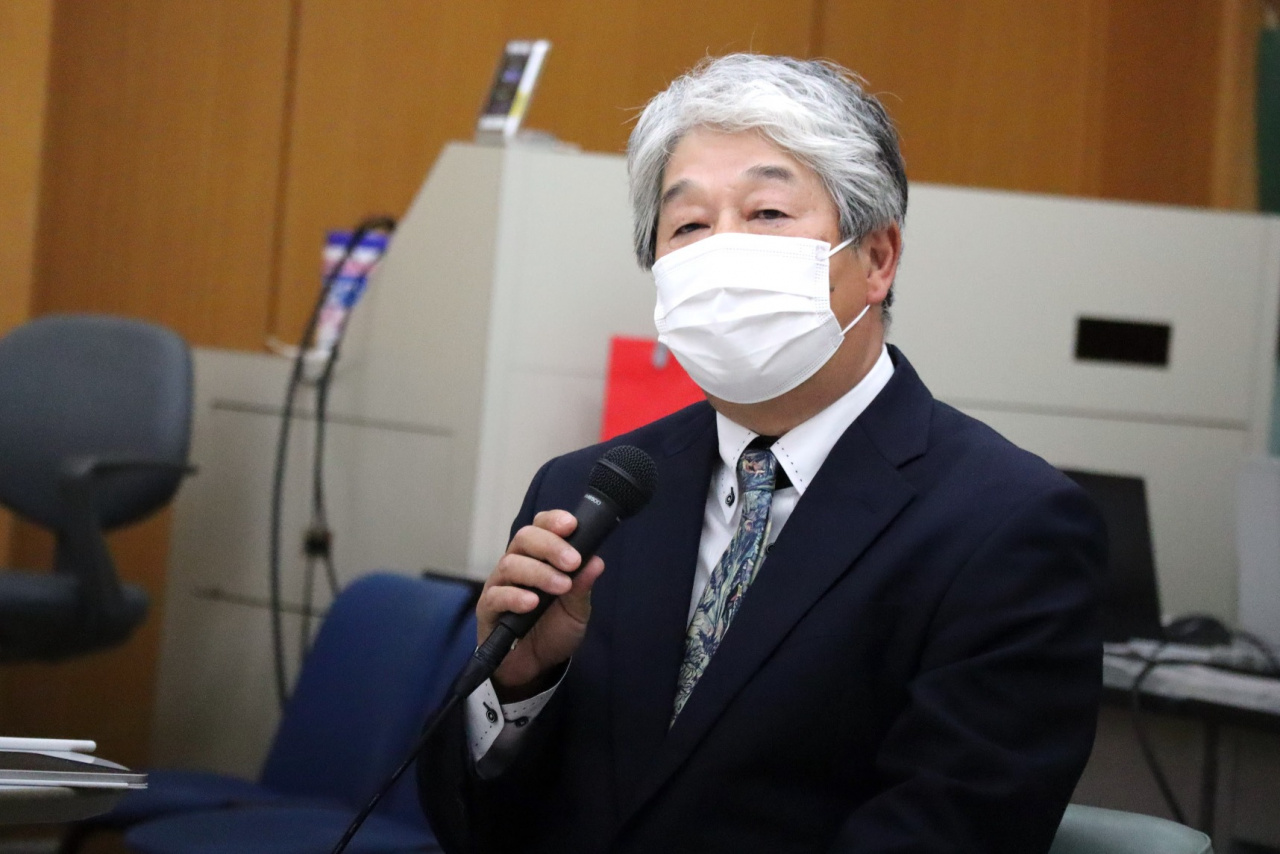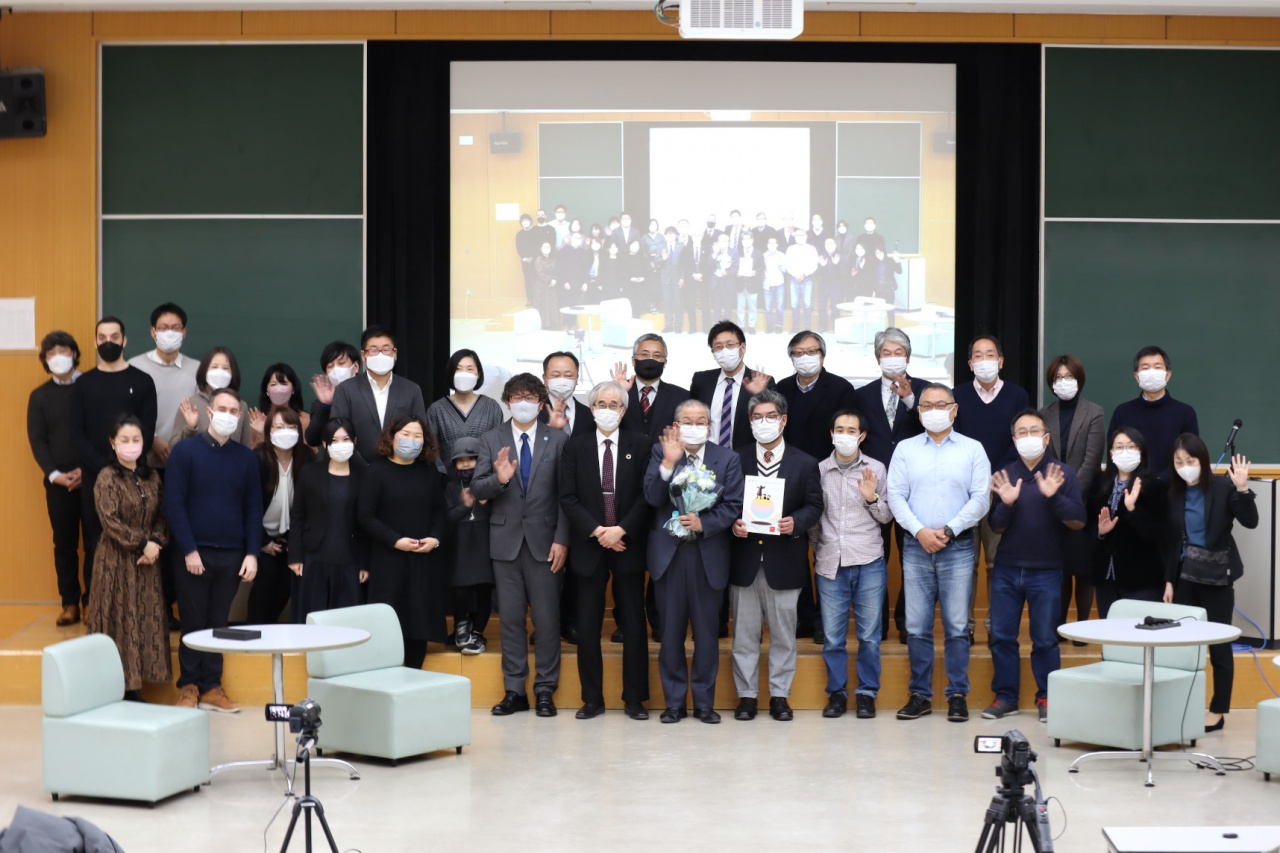2022.12.01
Criminology Research Center Symposium (Private University Research Branding Project, Final Report) Event Report Overview
Glocal Development in a New Age in Criminology: What does People-Friendly Criminology Bring to the Community?
From 13:00 on March 5, 2022, the Criminology Research Center (CrimRC) at Ryukoku University held the “Criminology Research Center Symposium (Private University Research Branding Project, Final Report)” at the Fukakusa Campus while broadcasting the symposium on YouTube The symposium covered achievements and prospects from six years of research activities and was attended by around 110 people in total, including around 40 in person at the event site and around 70 watching the broadcast.
Overview
CrimRC was founded in June 2016 and in November of the same year was selected for the Private University Research Branding Project by the Japanese Ministry of Education, Culture, Sports, Science and Technology. CrimRC has sought to explain criminal phenomena from the standpoint of human, social, and natural sciences, and to formulate rational measures against crime grounded in interpersonal support.
This symposium was divided into two parts: Session 1 was a report of accomplishments titled “Towards Establishing a New Age in Criminology,” and Session 2 was a talk session titled “Glocal Development: What does Criminology Bring to the Community?” The symposium was moderated by Professor Akiko Kogawara (Faculty of Law/CrimRC Forensic Methodologies Unit Director).
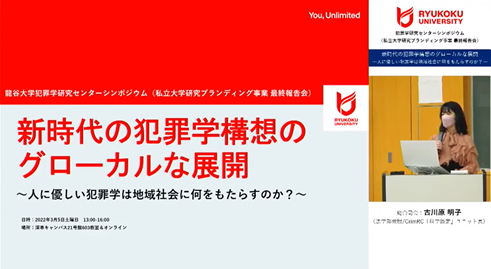
Opening remarks were provided by Professor Masahiro Tsushima (Faculty of Sociology/CrimRC Research Section Director). Professor Tsushima explained the activities of the center to date and stated the aim of this symposium, “Looking back on the recent six-year project period at CrimRC, we would like to adopt a glocal perspective in describing the current situation, achievements, and prospects for the new age in criminology.”
Session 1: Report of Accomplishments “Towards Establishing a New Age in Criminology”
CrimRC has three sections: an Education Section, a Research Section, and an International Section. The Education Section has implemented research findings in society, the Research Section has combined and systematized a diverse range of “knowledge” about crime, and the International Section has encouraged academic exchange with researchers, practitioners, and research institutions in other countries while spreading Japanese “knowledge.” Session 1 took the form of a final report of accomplishments, with each section giving a general overview of their activities over the past six years.
Education Section General Overview “Seeking to Establish Educational Groups and Youth Development”
Professor Shinichi Ishizuka (Faculty of Law/CrimRC Center Director) started the session by giving a general overview of the Education Section. Professor Ishizuka explained how, due to a dearth of faculties of criminology involved in research, education, and personnel development in Japan, the Education Section aimed to establish a faculty of criminology and graduate school of criminology, and listed the following three goals: (1) to create a criminology curriculum, (2) to evaluate and propose criminal policy, and (3) to foster leaders. Professor Ishizuka noted how information and communications technology (ICT) and other new media had gained prominence in the “With Corona” era, but raised concerns over whether ICT was at odds with criminology due to the empirical nature of criminology being one of its greatest strengths, such as the practical examination of tangible actions and numerical-based examination of criminal phenomena. Professor Ishizuka also stated that ICT allowed for interaction with overseas researchers and students and the increasing adoption of ICT had allowed research and education to be pursued internationally.
The Professor reported on developing a Faculty of Criminology syllabus with the help of young researchers who are expected to become leaders in criminology. For each class in the syllabus, researchers created a 5 or 15-minute video and made them available online. The Professor also reported on the development and dissemination of educational methods. Professor Ishizuka stated that criminology has traditionally been the domain of specialists involved in criminal justice such as practitioners and researchers, but a broader perspective is needed to establish criminology as a “science.” Professor Ishizuka stated that the people who really need criminology are those who commit crime and those who are victims of crime or suffer the effects of crime, i.e., the general population; hence, criminology must be viewed from the perspective of “criminology of the people, by the people, for the people.”
However, Professor Ishizuka noted that a shortage of researchers and educators and a negative image surrounding “crime” have prevented the establishment of faculties of criminology in Japan. He quoted the words of Tsuneo Kondo, the founder of Nihon DARC (drug addiction rehabilitation center), who said “What the world needs, the world creates.” Professor Ishizuka ended the report of accomplishments with, “Let’s take a comprehensive look at criminal phenomena. Let’s work together to deal with the problems. This is the only approach that will produce long-lasting results. This is criminology. Criminology demonstrates there are things we cannot see because we are clouded by prejudice and “common sense” and avoid venturing into the field. The time will come when faculties of criminology are established in Japan. The fundamental need for criminology makes this a certainty.”
Following the general summary of each section, President Takashi Irisawa offered his comments. The President stated, “SDGs are currently in the spotlight, but sustainable development goals will never be achieved without altering the perspective of individual people. Given that changing perspective and behavior is a Buddhist teaching, Ryukoku University is effectively promoting “Buddhist SDGs.” At last year’s symposium, it was noted that Ryukoku University already implements SDGs in the form of the university’s Corrections and Rehabilitation Degree Program and the activities of the Criminology Research Center. I believe there is great potential at Ryukoku University. Hearing about the last six years of work in each section, many students must have been involved in these activities and I believe chemical changes have occurred in the minds of those students.” As President Irisawa talked about Indian Buddhism, his specialist field, he also stated, “Buddhist teaching has long been highly conscious of crime. Not just crimes committed by people or behavior that occurs consciously, but crimes that transpire unknowingly. That is, Buddhism is highly conscious of people’s actions. I believe this is Buddhism’s greatest strength. Criminology as a discipline has an interdisciplinary character that is closely connected to Buddhism as well as psychology, sociology, and child education. I have a firm belief that we can spread peace by integrating the core Buddhist teaching of “Engi,” mentioned earlier in the report. In the course of daily life, however, people often lose sight of the fact that they are the product of diverse relationships and support. People become self-centered and behave in ways they never imagined. We create environments that discourage crime; and if someone makes a mistake, create environments where those people can recover from their mistake. I would like to see Ryukoku University as the wellspring for these types of initiatives. Although the Branding Project has ended, I look forward to seeing young people take on this mantle.”
Session 2: Talk Session “Glocal Development: What does Criminology Bring to the Community?”
Session 2 featured three talk sessions that examined local issues from a glocal perspective. Researchers from the Center examined modern social issues such as “discrimination and isolation,” “recidivism prevention,” and “university education in the Covid era” from a diverse range of perspectives including legal, social, psychological, and religious studies, providing a true fusion of knowledge in criminology. Part of the session on the prevention of recidivism is presented here.
“Recidivism Prevention and the Local Community; the Ability to Adsorb and Integrate”
Since enactment of the so-called “Act for the Prevention of Recidivism” (2016), prefectures and municipalities have become increasingly interested in crime prevention and recidivism prevention. From the perspective of community development, what are the problems faced by offenders during rehabilitation and desistance, and what are the barriers to the participation of offenders in society? The topic was introduced by Professor Koichi Hamai (Faculty of Law/CrimRC International Section Director, Policy Evaluation Unit Director), then a talk session was held with perspectives offered by Professor Satoru Yoshikawa (Faculty of Letters/CrimRC Dialogical Communication Unit Director), Professor Yoshiyuki Inoue (Faculty of Law/CrimRC Correctional Religious Studies Unit Director), and Associate Professor Hironori Komasa (Faculty of Letters/CrimRC Forensic Psychology Unit Member). The moderator was Professor Ishizuka.
Initially, Professor Hamai stressed that “people can regret their actions alone, but cannot rehabilitate alone.” Explaining the events leading up to enactment of the “Act for the Prevention of Recidivism” (2016), Professor Hamai touched on the overcrowding of prisons due to the security deterioration fallacy and the era of increased punishment (from 1995 to 2005) and the conversion of prisons into nursing homes as large numbers of elderly people with nowhere to go were housed there, and described an about-face in the Japanese government policy that moved to comprehensive measures against recidivism (the importance of “a place to belong” and “opportunity”) (2012). Professor Hamai also provided a point of caution regarding the term “recidivism prevention”, given that the Japanese government discusses recidivism prevention in terms of protecting society rather than rehabilitation of offenders, and in terms of policy regards offenders as risks to be controlled (problems to be dealt with) rather than people who listen and can rehabilitate. He stated it is important that social welfare services and communities involved in rehabilitation see offenders as members of the community and agents of desistance, and that links with family, friends, and social surroundings are essential.
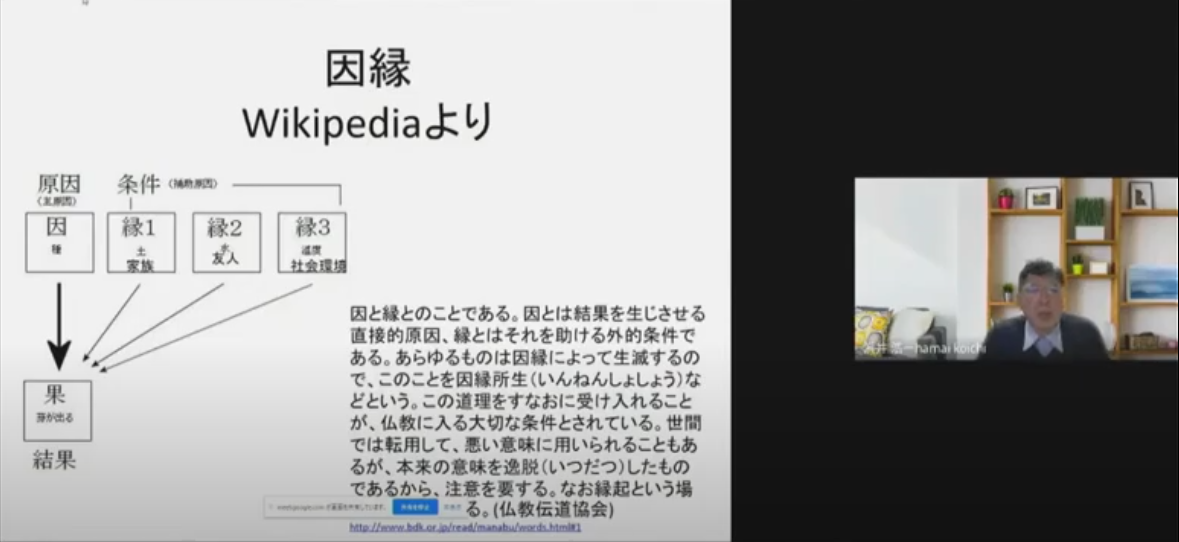
Professor Koichi Hamai (Faculty of Law/CrimRC International Section Director, Policy Evaluation Unit Director)
Professor Inoue, director of the Correctional Religious Studies Unit, who has been conducting foundational research aimed at raising the prominence of prison chaplains, noted that people who commit crimes have a troubled life, and the cause of that trouble is not something inherent to those people, but springs from interpersonal relationships and chance encounters. He also argues that, assuming that everyone might commit crime given an inopportune set of circumstances and failed relationships, committing crime and desistance from crime must be viewed within a broader context than individual relationships or the one-on-one relationship between the offender and prison chaplain. The thesis of the Correctional Religious Studies Unit is “to reexamine religious preaching, and through education and practice teach people about the mutually supportive nature of society and relationships.” The view of humanity that presumes anyone might offend also suggests that anyone can engage in various ways to support desistance. This view of humanity is evident in the spirit of Jōdo Shinshū (Shin Buddhism), the founding spirit of Ryukoku University, and in Shinran’s view of humanity. Shinran did not call people given the label of wrongdoer “they” but “we.” Just as people commit crime due to troubles brought on by a chance set of circumstances, people can desist from crime due to a chance set of circumstances. Professor Inoue concluded by saying that understanding crime from the perspective of “we” may not have the immediate effect of treating the symptoms of a given disease, but will have a slower effect in helping offenders to refrain from crime, similar to the effect of Chinese herbal medicine on the constitution.
After Professor Inoue’s report, Professor Ishizuka noted how traditional criminal justice sees offenders and victims as being separated by a river, when, in fact, the two parties reside on a contiguous body of land. Communities must be flexible and robust enough to prevent rivers created by rainfall in the mountains from dividing the land between us. Professor Ishizuka explained that while the interchangeable nature of victims and perpetrators is becoming a more important focus in discussions surrounding the prevention of recidivism and the local community, many challenges still lay ahead.
Associate Professor Komasa of the Forensic Psychology Unit noted how the comments so far reminded him that, “A mountain covered in bamboo groves is not susceptible to landslides because it is protected by the roots of the bamboo.” He also offered a clinical psychology perspective on the session and pointed out that both offenders and their supporters may feel misunderstood by the people around them. He noted how people often say it is important to nurture a desire to understand others, but it may be more important for each person to feel understood by others. He stated that bringing together individuals with this feeling of being understood should nurture a desire to understand others.
We must not just support the offenders, but also avoid isolating those who provide support to offenders. The importance of a protective network of people, like the roots of a bamboo forest, becomes obvious when we consider this topic in the context of the ability of communities to absorb and integrate. Associate Professor Komasa stated this can be cultivated by working to integrate a feeling of being understood into university education.
Professor Yoshikawa, the director of the Dialogical Communication Unit, described an episode involving a certain person released from prison in the USA and asked session participants what side of people they would rather communicate with when meeting someone. He explained that when we interact with people, communication can be a dialog, a monologue, or a conversation. Someone in charge of a group looking after elderly people in Kyoto City once asked Professor Yoshikawa for advice on communicating with the elderly. The advice given by Professor Yoshikawa was, “When you visit someone’s home, try finding something good the person is doing and complimenting them on it.” After about a year of normal interaction, the person reported that communication had improved with almost all their elderly clients. The opening exchange was key to creating dialog and what side of someone you communicated with. Professor Yoshikawa expressed his hope this type of opening exchange could be used with people in the desistance process.
General Overview
After a lively talk session, Professor Ishizuka looked back on the symposium as a whole and added his comments. Professor Ishizuka stated, “Criminology is probably the only discipline that can call doubt on war and other crimes of the State, and call doubt on criminal policy, which can err in the rush to “correct” judgment. Although CrimRC brings researchers together from a wide range of disciplines, today’s symposium leaves me with the impression that everyone at CrimRC shares this willingness to call “correct” judgments into doubt.
CrimRC has aimed to systematize a new criminology that fuses diverse fields of knowledge on crime, to use these findings to scientifically realign sets of policies on various criminal phenomena, and to nurture leaders in criminal policy who can adapt to the demands of the times. The Private University Research Branding Project came to an end in March 2022, but under a new structure, from April 2022, CrimRC continues to take on the challenge of establishing a new age in criminology.
